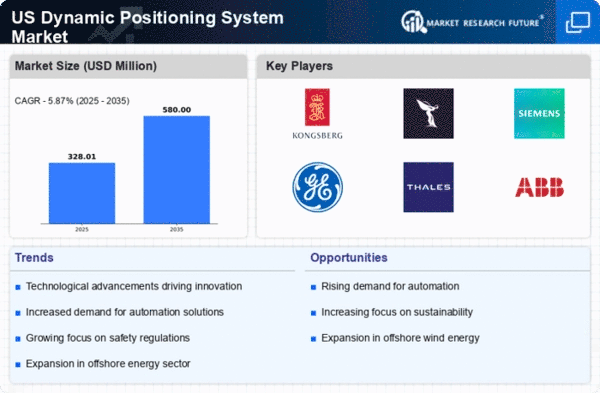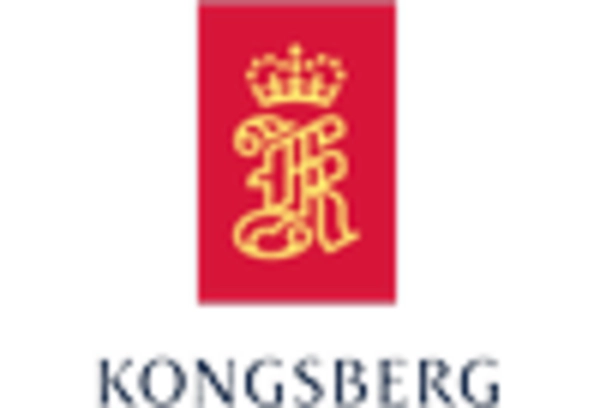Focus on Safety and Risk Management
The dynamic positioning-system market is increasingly shaped by a heightened focus on safety. This focus on risk management in marine operations is crucial. Regulatory bodies and industry stakeholders are emphasizing the importance of robust positioning systems to mitigate risks associated with maritime activities. In 2025, it is expected that compliance with safety regulations will drive a 15% increase in the adoption of advanced dynamic positioning systems across various sectors, including shipping and offshore drilling. This focus on safety not only enhances operational reliability but also protects the environment from potential hazards. As companies prioritize risk management, the dynamic positioning-system market is likely to expand, reflecting the growing recognition of the critical role these systems play in ensuring safe marine operations.
Growing Investment in Marine Technology
The dynamic positioning-system market is experiencing a surge in investment as companies seek to enhance operational efficiency and safety in marine operations. The US government has allocated substantial funding towards the development of advanced marine technologies, which is expected to bolster the market. In 2025, the market is projected to reach approximately $1.5 billion, reflecting a compound annual growth rate (CAGR) of around 8% over the next five years. This investment trend is driven by the need for improved navigation and positioning systems in various marine applications, including offshore drilling and shipping. As the industry evolves, the integration of cutting-edge technologies such as artificial intelligence and machine learning into dynamic positioning systems is likely to further propel market growth.
Expansion of Maritime Trade and Logistics
The dynamic positioning-system market is poised for growth. This growth is due to the expansion of maritime trade and logistics in the US. With the increasing volume of goods transported via sea, there is a heightened need for efficient and reliable positioning systems to manage shipping operations. In 2025, the US maritime industry is projected to handle over 2 billion tons of cargo, which underscores the importance of dynamic positioning systems in ensuring safe and efficient navigation. This growth in trade is likely to drive demand for advanced positioning technologies that enhance operational capabilities and reduce the risk of maritime accidents. As logistics companies seek to optimize their operations, the dynamic positioning-system market is expected to thrive.
Rising Demand for Offshore Renewable Energy
The dynamic positioning-system market is significantly influenced by the increasing demand for offshore renewable energy sources, particularly wind and solar. As the US aims to transition towards cleaner energy, the deployment of offshore wind farms is gaining momentum. By 2025, it is estimated that the US will have over 30 GW of offshore wind capacity, necessitating advanced dynamic positioning systems for installation and maintenance. This shift towards renewable energy not only supports environmental goals but also creates a robust market for dynamic positioning systems, which are essential for ensuring the stability and efficiency of offshore operations. The market is likely to benefit from this trend as companies invest in reliable positioning technologies to support their renewable energy initiatives.
Technological Integration in Marine Operations
The dynamic positioning-system market is benefiting from the ongoing technological integration within marine operations. The adoption of Internet of Things (IoT) devices and real-time data analytics is transforming how vessels operate, leading to increased efficiency and safety. In 2025, it is anticipated that over 60% of vessels in the US will utilize advanced dynamic positioning systems that incorporate IoT technology. This integration allows for better monitoring and control of vessel movements, which is crucial for industries such as shipping and offshore oil and gas. As companies recognize the advantages of these technologies, the dynamic positioning-system market is likely to see a significant uptick in demand, driven by the need for smarter and more connected marine operations.
















